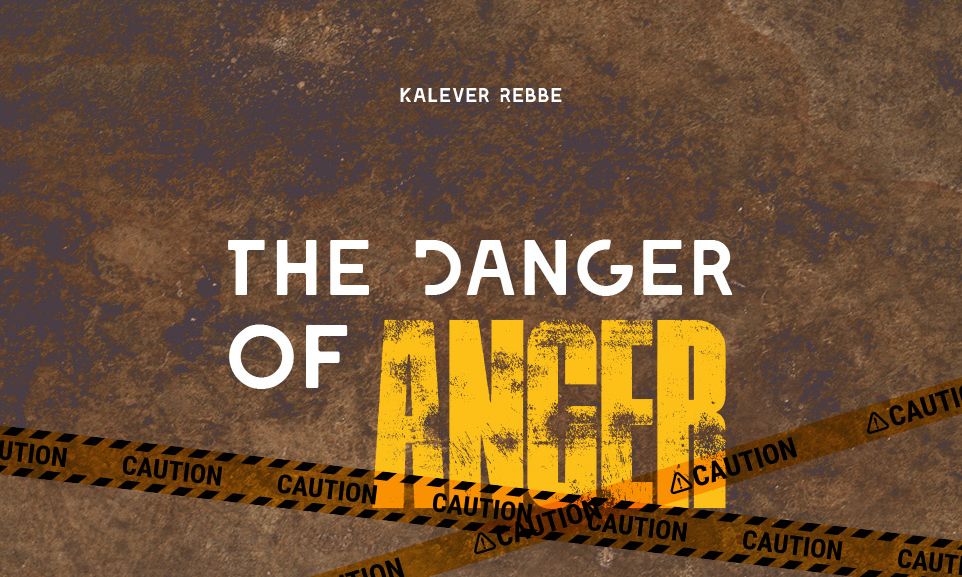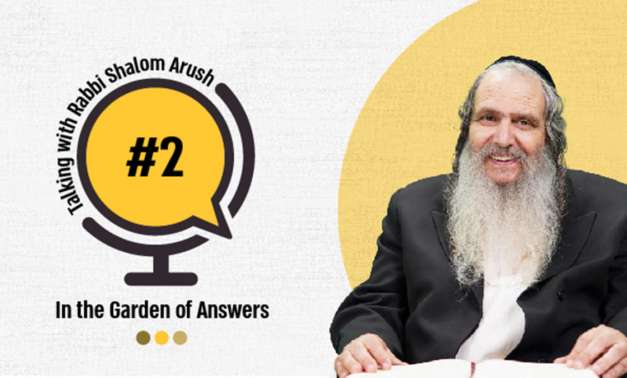
The Danger of Anger
The pervasive anger that we see everywhere – what's the cause and can it have far-reaching effects on the Jewish home? The Kalever Rebbe explains...

From Mount Hor turn to the entrance of Hamath, and the ends of the border shall be toward Zedad. (Bamidbar 34:8)
The world is becoming increasingly angry. People are enraged everywhere. People are upset with their governments, different organizations – everything seems to spark their anger. Even leaders of nations, politicians, appear angry and use fiery speeches to rouse their supporters because they can identify with that anger.
Unfortunately, we can see with our own eyes the ramifications of this anger and strife. Employees are dismissed from their jobs. The divorce rate has increased. Children and their parents stop speaking with one another. And even teachers have been influenced and have pushed children away, forcing them to drop out of school.
Pride is the Root of All Anger
The root of this anger is pride. If someone is proud and haughty, then they never assume responsibility. They are perfect in their eyes. Therefore, whenever something doesn’t work out, whenever they fall, they look to blame that failure on someone else. And their pride is blinding; they actually believe this other person is responsible. They become angry and spiteful at this person.
Pride and anger lead to disputes and arguments. As Chazal taught (Sotah 47b), From the arrogance of the heart – there are many disputes in Israel.
When a Jew succumbs to this evil and impure character trait of pride and haughtiness, they feel like they are better than everyone else. Therefore, they discredit any virtues they might find in other people and only focus on their flaws, fueling the fire of disagreements and baseless hatred.
Indeed, we have seen an increase in serious disagreements. This is indicative of what Chazal taught (Sanhedrin 97a) that before the coming of the Mashiach, Satan will try to cause groups of people to behave like herds of animals that always quarrel with each other, when the people of each group will say that everything they think and do is the truth. And everything that people of other groups think and do is false and bad.
The Aftermath
Anger and arguments destroy the lives of countless people and their families. Chazal taught (Nedarim 22a) “Anyone who is angry will have all kinds of Gehinnom rule over him.” Meaning, the trait of anger causes Gehinnom to rule over all matters of his life while in this world. In general, when someone is angry, even if he is a wise and sensible person, that anger overwhelms him, and all of his wisdom and sensibilities are abandoned. He loses his judgement at that moment. He may begin to shout and scream frantically losing all sense of composure and control. He can appear like a madman. And, when he realizes how embarrassingly he is behaving, he becomes even more angry and blames others for his behavior. And the cycle repeats itself. He makes enemies. People start to think he is a vile, negative, and despicable person. And in the end, the honor and respect he thought he was defending and fighting for became worthless fulfilling the words of Chazal (Kiddushin 41a), he managed to acquire only anger. The only reward he received was his own irritation.
There is an even greater loss when there is strife and anger between a husband and wife because it leads to divorce which is followed by regret and pain. They do not only ruin their own lives, but their children suffer the same pain and sorrow. The damage is even worse when parents and teachers direct their anger towards children. It destroys them. It breaks them. It takes away any positive view of self and they squander their talents. Feeling rejected, they turn towards behaviors like lying and stealing. They start to associate with friends whose behaviors are equally disturbing and destructive. They abandon Torah and mitzvot. These parents and teachers who cannot control their anger have contributed to creating most of the children we see nowadays who are struggling.
Chazal warn us (Gittin 7a) that a person must speak softly to his family on Erev Shabbat when it becomes dark. This is a time when the Yetzer Harah is desperately trying to infuse anger into your home.
If you try to discipline or offer guidance with anger, it will not be received. As Chazal taught in Pirkei Avot (2:4), a short-tempered person cannot teach… And Sefer Chassidim (306) relates a story of a sage who replaced a teacher during study because he noticed that the first teacher was angry.
R’ Chaim Vital in Shaar Ruach HaKodesh (page 11) relates that his teacher, the AriZal, warned him not to get angry when he taught his brother even though he was unable to learn the way he wanted him to. R’ Chaim also wrote (towards the end of his introduction to Eitz Chaim) that even when you have to discipline or reprimand your children it should never be done with anger.
The Rambam writes (Deot 2:3): Anger is also an exceptionally bad quality. It is fitting and proper that one moves away from it and adopts the opposite extreme. He should school himself not to become angry even when it is fitting to be angry. If he should wish to arouse fear in his children and household – or within the community, if he is a communal leader – and wishes to be angry at them to motivate them to return to the proper path, he should present an angry front to them to punish them, but he should be inwardly calm. He should be like one who acts out the part of an angry man in his wrath but is not himself angry.
My grandfather, R’ Tzvi Elimelech from Dinov, zt”l, wrote (the additional writings 2:37) that even though the Kadmonim (Rishonim and early Achronim) taught that it was OK to appear angry when disciplining your children, you must be extremely careful. For, the Yetzer Harah can enter your heart through something that is permissible. And, by allowing yourself to only appear angry, the Yetzer Harah will use this to slowly instill true anger in your heart.
This is what the pasuk is teaching us:
From Mount Hor – when a person allows himself to feel haughty like a large and mighty mountain, he will
… turn to the entrance of Chamat – he will become angry (Chamah – חמה in Hebrew) and hateful. And the result will be
… and the ends of the border shall be toward Tzedad. – Your children will drift to the side (Tzeidah – צד) and abandon the straight and just path of holiness, may Hashem protect us.
***
The Kalever Rebbe is the seventh Rebbe of the Kaalov Chasidic dynasty, begun by his ancestor who was born to his previously childless parents after receiving a blessing from the Baal Shem Tov zy”a, and later learned under the Maggid of Mezeritch zt”l. The Rebbe has been involved in outreach for more than 30 years and writes weekly emails on understanding current issues through the Torah. You can sign up at www.kaalov.org.







Tell us what you think!
Thank you for your comment!
It will be published after approval by the Editor.